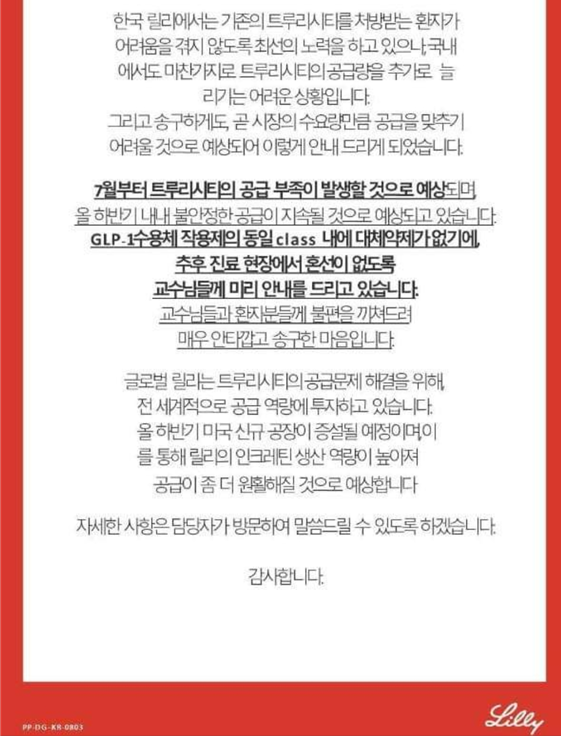Local doctors have expressed concerns about Eli Lilly Korea's notice about an upcoming shortage of Trulicity, a glucagon-like peptide-1 (GLP-1) receptor agonist that treats type 2 diabetes.

Lilly Korea recently sent out a notice to local doctors stating that the company expects to experience a shortage of Trulicity starting in July, and expects unstable supply to continue throughout the rest of the year.
The company stressed that while it is doing everything it can to ensure that patients with existing prescriptions for Trulicity do not experience any difficulties, it is unable to increase the supply of Trulicity in Korea, and the company will soon be unable to keep up with market demand.
"As there are no alternatives within the GLP-1 receptor agonist class, we are providing advance notice to physicians to avoid confusion at the point of care," the notice read. "We apologize for any inconvenience this may cause to the doctors and patients."
As a solution, Lilly Korea explained that it is investing heavily in increasing supply capacity globally to address Trulicity's supply challenges.
"Later this year, a new U.S. plant will be ramped up, which will increase Lilly's capacity to produce Incretin, which we expect will improve supply," the company said.
Regarding the matter, a local physician expressed his concerns.
"Although the weight loss effect is not so great, Trulicity is a diabetes medication that utilizes the advantages of once-weekly injections," wrote Professor Kim Dae-jung of the Department of Endocrinology and Metabolism at Aju University College of Medicine on his Facebook page. "While we may be able to prescribe other drugs to new patients, it seems that patients who have been receiving Trulicity will suffer confusion as they will have no choice but to use a once-a-day GLP-1 injection."
Professor Kim went on to express his worries about Korea becoming a not-so-important market in the global pharmaceutical industry these days.
"I don't know if it's only in the diabetes field, but when it comes to diabetes-related products such as continuous glucose monitoring devices (CGM) and insulin pumps, Korea is always last to introduce them," he said. "This is because there are so few users."
Kim also said there are also many issues with diabetes drugs being out of stock.
"It is still unsure when Novo Nordisk's semaglutide products, such as Wegovy and Ozempic, will be officially launched in Korea, which is a sad reality," he said. "In contrast, Japan is freely prescribing the drugs."
Kim stressed that this is because Korea is not an attractive market from a global perspective because the country does not recognize the full price of the drug.
Shortage of GLP-1 receptor agonist drugs is not only pertinent to Korea, as the global community, including the U.S., where the GLP-1 drugs are most prescribed, is also facing product shortages.
Notably, the U.S. is seeing a shortage of GLP-1 receptor agonist drugs after the explosive demand for Novo Nordisk's obesity drug Wegovy affected the supply of Ozempic and Lilly's Trulicity.
According to local reports, as both Ozempic and receptor agonists Trulicity are in the same class of GLP-1 analogs as Wegovy, it has led to increased demand from Americans for weight loss.
As a result, the U.S. Food and Drug Administration (FDA) had added Ozempic and Trulicity to its shortage list in April.
The FDA attributes this to increased demand for these drugs due to "off-label" prescription, which refers to the practice of prescribing a drug for indications other than those for which it was approved.
Meanwhile, Lilly Korea was unavailable for immediate comments regarding when the Trulicity shortage will be resolved.

